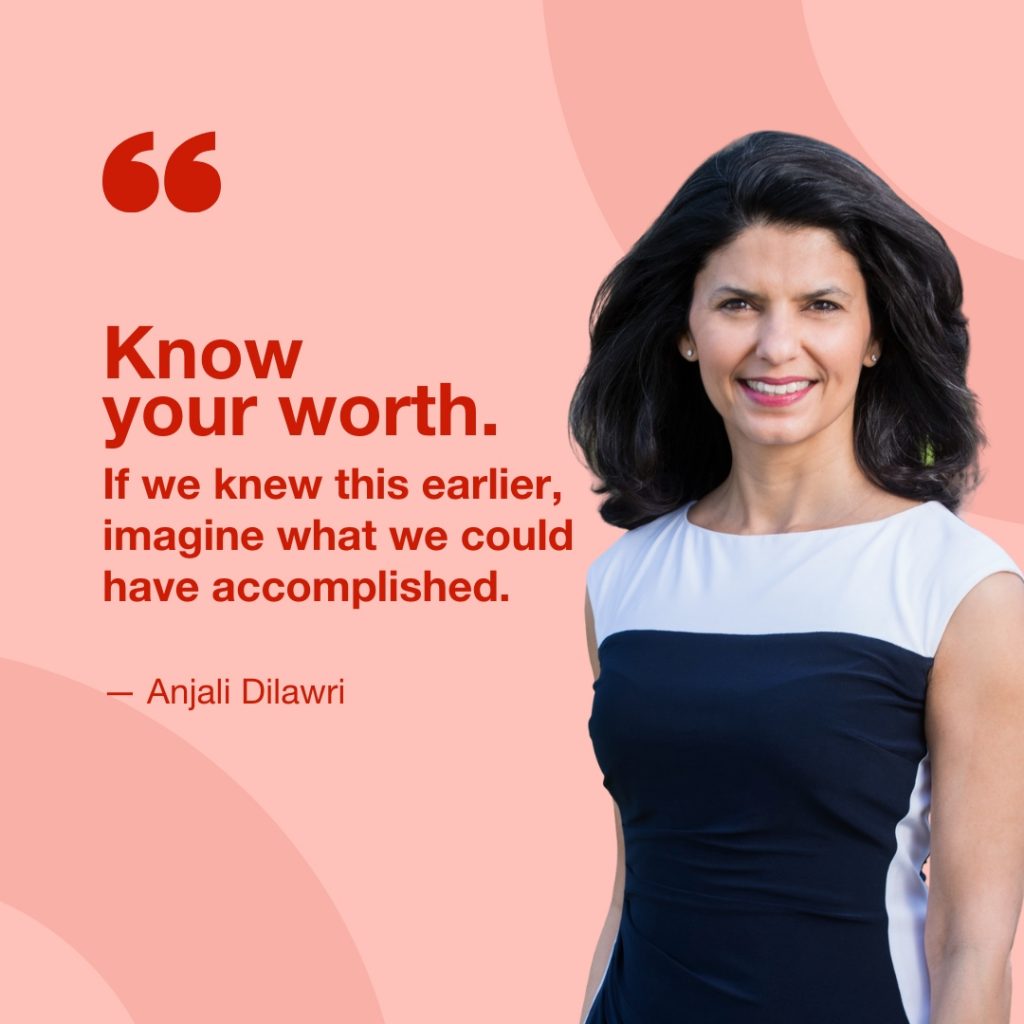After climbing the ranks over a career that has spanned nearly 30 years, Anjali Dilawri became the first – and only – woman partner at Logan Katz, a forward-thinking public accounting firm (and Invest Ottawa sponsor) in Ottawa. Both within her role and as a celebrated leader, Anjali champions the personal and professional empowerment of women through community, representation and a healthy dose of pride.
We sat down with her to find out how she stepped into her power and fostered the space for others to do the same.
What does it mean to fail? When have you failed, and how did you overcome it?
To fail is to try, which means you’re doing something right. When you get in the ring, as Brené Brown says, failure is just a lesson. It’s refreshing because you realize that you can get back up and move on.
I trained myself to shut down the voice that says, “you shouldn’t have even tried,” to say, “What a great lesson,” instead. I developed it by getting out there, and with a lot of reading, mindfulness, and awareness. As my career progressed, I gained more confidence. I didn’t have that in the beginning.
You’re touching on this idea of training our minds to react to certain things – like failure – in a healthier way. With what you know today, what is a piece of advice that you would give to your younger self?
 Know your worth. If we knew this earlier, imagine what we could have accomplished, how we could have seen the world differently, what opportunities could have come our way – or that we could have created.
Know your worth. If we knew this earlier, imagine what we could have accomplished, how we could have seen the world differently, what opportunities could have come our way – or that we could have created.
We’re indoctrinated to think women should be a certain way. I think it fosters a greater fear of failure amongst women. I grew up reading magazines and watching shows where I was not represented, where I didn’t exist. I was afraid of failure when I was trying to be myself. I had fire in me, but I could never measure up. I wish we could have all seen how amazing we are as women.
I don’t think the new generation is like that. They’re empowered and are proud of all aspects of themselves, even their bodies, no matter what they look like. It’s amazing to see artists like Lizzo, who performed at the Grammys and all her dancers were diverse, curvy women. Think about the positive impression that makes on girls. We didn’t have that. We had constrained standards of how women should look, talk, what they should wear and pursue as a career. We never knew what our worth was.
Growing up, I was a great exam taker. I could learn the rules and spit them out and get 100%. I applied that to life. I learned the rules. What do I need to do? What do I need to say? What do I need to wear? I did that, and I succeeded. It’s only later in life that you go, “Forget the rules! What about me? How do I think this should be done? How do I close the deal?” And I didn’t know, because I didn’t know who I was, because I was so busy learning who I should be.
There’s also this taboo where women, even when they achieve great things, aren’t comfortable expressing pride. Can you think of a time when you’ve been proud of an achievement? Were you able to experience, and own, that celebration?
It’s not considered attractive for women to be proud, but it’s considered a very attractive quality in men. It’s how we’ve been trained. We’re supposed to be humble. It’s not considered ‘ladylike’ or ‘classy’, and why not? It’s crazy.
I’m proudest when I stand up for the underdog – and sometimes the underdog is myself – and have difficult conversations. I refuse to do what’s expected when it isn’t authentic to me. Recently, we had lunch and learns where partners present on a topic – of their choosing – to the whole firm. I chose to talk about unconscious bias in the workplace. It’s an uncomfortable subject. We watched a fantastic video. Some people were a little bit fidgety, but if you don’t talk about it, nothing will change.
I see businesswomen doing amazing things; they are so modest. They’re under the radar. I tell them you need to be proud. I want to profile you. They often go, “no, not me, maybe her.” And I say, “no, I’d like to profile you. Women need to be showcased more.
I find that women tend to think collectively, which can benefit us or be used to minimize us. It‘s inspiring to see women who fought tooth and nail to get into positions of power and influence going, “what can I do to ensure that the women after me don’t need to do what I did to get here?” That’s a champion. How would you define a champion? Who has been one for you, and how have you been one to others?
I completely agree. Being a champion means lifting others. I try to do that. My sheer presence as a leader in the firm is so important because I never saw people like me at the top. I want to show younger women that the potential within them is lying dormant. I want to get that fire going.
Research has shown that in meetings, women will voice an opinion on a matter and a man will take that idea, and talk about it like it was his. When that happens, I interject during the meeting and attribute the idea back to her. I’ll say, “about Kathy’s idea.” These subtle things make a big difference. They’ll say it doesn’t matter who gets the credit, but it’s not about credit, it’s about taking ownership.
While I have definitely had great supporters, I don’t think I had a champion per se, but I’m trying to be that for others. To recognize the achievements of women. And not only women, but people of colour, and from marginalized groups.
Empowering people from diverse groups to succeed is good for everyone because it builds towards a future that is more inclusive and, frankly, more exciting. How can we encourage others to help women advance?
What you see in the mainstream must change. There must be a more diverse representation of women across sectors and industries. The more you see it, the more possible it becomes in the minds of women, and the more likely they are to explore diverse fields. I’m trying to shine a light on women in our community who are succeeding, through our Laughter and Konversation event. It’s a quarterly, women’s only networking event where I profile a successful woman in our community.
This event is doing three things. One, it offers a vehicle for women in our business community to build important relationships. Second, our community gets to support and learn from the profiled speakers – not only from their work but from their story. When I invite someone, I ask them to share their struggles, so that we can learn how they overcame them. Some women have talked about how they launched their business while going through a divorce and caring for their kids. You always come out of those events thinking, “I can do anything.”
Third, it gives the speakers well-deserved and needed exposure, offering a platform to recognize and celebrate their achievements to help them to grow, to empower them. Many have said that they’re not good at public speaking. That’s part of why we keep it intimate, to 30 women, rather than putting them on stage in front of 500 people. Every time these women, who think they can’t speak, are done, they thank me and say that they didn’t know that they had a story.
I’m a big fan of getting women on stage. We sponsor the Emerging Entrepreneur Category at the Women’s Business Network’s Businesswoman of the Year Awards Gala and I really enjoy my few speaking minutes I get there, where I try to use my time wisely and speak on female empowerment, (for as much as people will tolerate at an awards show). We’re doing great things; we just need to talk about them. It’s self-fulfilling: you see it, so you can be it.
Thank you, Anjali for taking the time to share your experience and perspective with our community.
On March 8, the world celebrates International Women’s Day. From March 2 – 9, our region will run the 2nd Annual International Womxn’s Week: IWW 2020.
Our community has a shared goal: to inspire, equip and empower women professionally. That’s why we’re coming together to host eight jam-packed days of events. We want all folks, across all sectors, engaged and working collaboratively to expedite change. That includes you.
To learn more about International Womxn’s Week, visit our IWW webpage.
Mariam Zohouri is the Content and Engagement Specialist for Invest Ottawa and Bayview Yards. In business, technology, public office and community impact, leaders have trusted her to bring their stories to life.







